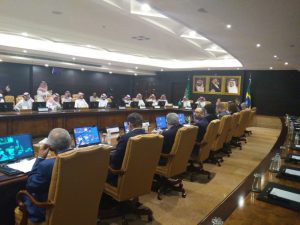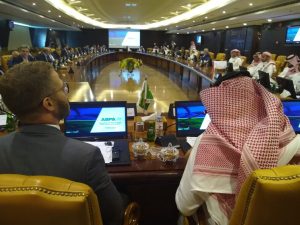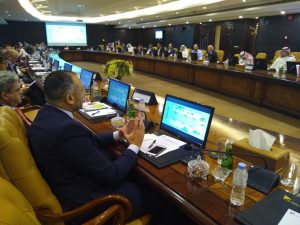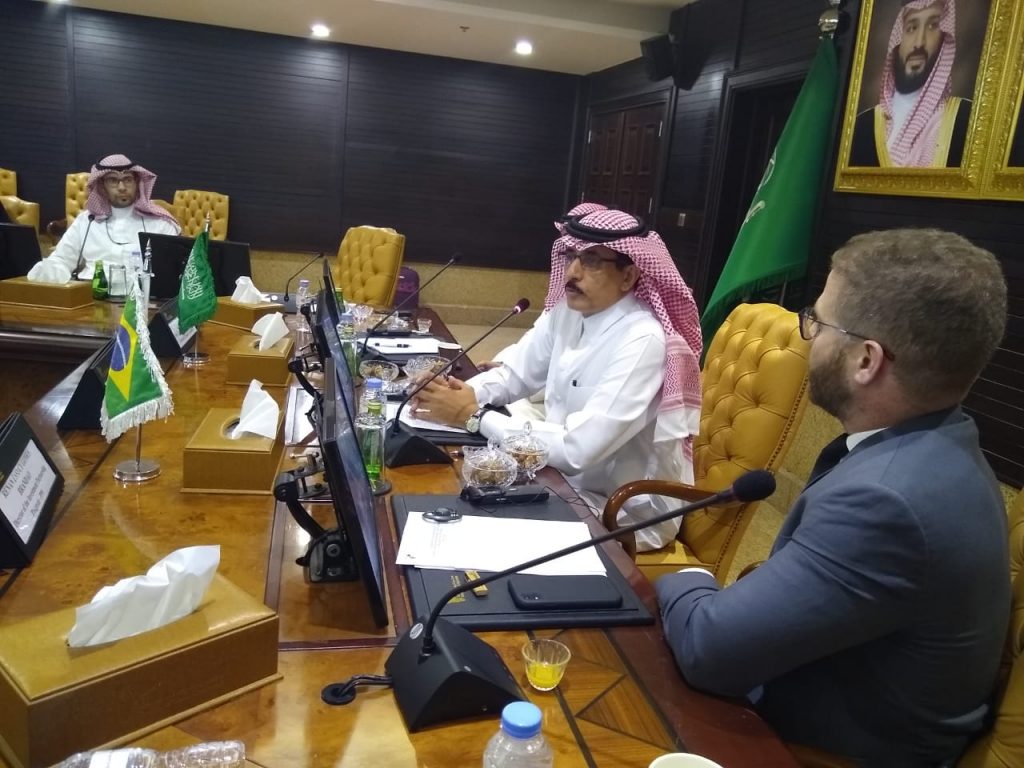Riyadh – The Saudi Agricultural and Livestock Investment Company (SALIC) is seeking new investment targets in Brazil’s agriculture and logistics industries. So said SALIC managing director Khaled Mohammed Al-Aboodi (top picture) told ANBA this Tuesday (17) following the Brazil-Saudi Arabia Seminar in Riyadh.

The event took place at the Council of Saudi Chambers, as part of Brazil’s Agriculture, Livestock and Supply minister Tereza Cristina’s ongoing tour of the Arab country. SALIC owns a 32.9% stake in Minerva, a major Brazilian meat company active locally and elsewhere in Latin America. “We’re happy because this is good diversification for us,” said Al-Aboodi.
But the company is considering investing in other fields. “We are looking some more,” he said. When it comes to agribusiness logistics, he said he’s interested in soy and corn. Al-Aboodi said that Brazil is a target country for SALIC, and that the company is “ready for more.”
The managing director served as moderator for the seminar, which covered subjects including Brazil’s investment needs in agriculture and livestock infrastructure. Minister Tereza Cristina discussed Brazilian projects that require investing and could help address bottlenecks in the offloading of production.
“Brazil boasts high-yield farming, but some aspects from farm to port detract from our ability to compete at the international level,” the minister said. According to her, Brazil needs international partnerships to overcome the infrastructure challenge.
The minister went over two projects that will be made available to investors via auctions, and which are under the umbrella of the Special Secretariat of the Partnerships and Investments Program (PPI): the building of railways Ferrogrão and Ferrovia de Integração Oeste-Leste (West-East Integration Railway). The PPI oversees priority partnership projects for infrastructure investments, including concessions.

These and other of the PPI’s projects were also discussed by the director of the Program of the Transportation-Roads Coordination Secretariat, Renan Brandão. Spanning 933 km, Ferrogrão will require USD 3.1 billion in investment, and a public consultation is underway regarding its concession. The auction is expected to happen in 2020.
Also under public consultation at this time, Ferrovia de Integração Oeste-Leste will link up Brazil’s western areas and its eastern seaports and will be a key outlet for carrying ores and grains. Its first phase of construction is expected to require USD 805 million. according to Brandão, these railways will create a new path for exports, and drastically cut logistics costs.
Minister Cristina also focused on roads, which are an important outlet for Brazilian agricultural production. According to her, road concessions are expected to double in years to come. PPI projects provide for over 16,000 km in concessions going on auction through 2022.
She also said opportunities are available in Brazil in forest products, aquaculture and horticulture. She made clear that the country is interested in more Saudi investment. “Considering that Saudi Arabia is a major global investor and that Brazil has ranked among the leading foreign investment targets for years no, I believe there’s a huge potential for us to work together,” she said.

The seminar was attended by Brazilian and Saudi businesspersons and delegates. Arab Brazilian Chamber of Commerce secretary-general Tamer Mansour said during the seminar that Brazil and Saudi Arabia must take their relations to the next level. He said that the opportunities are in place, and they include Brazil making Saudi Arabia a hub from which to supply goods to the region. Mansour said Brazil is very “lucky” to have Saudi Arabia as a partner.
The Arab Brazilian Chamber secretary-general explained the organization’s work in building rapport and connecting Arab and Brazilian businesspersons. Karen Jones, COO of the Dubai-based Middle East and North Africa Office of the Brazilian Trade and Investment Promotion Agency (Apex-Brasil), was also a speaker at the seminar. She discussed the office’s trade- and investment-oriented work.
Brazilian speakers also included Brazilian Confederation of Agriculture and Livestock (CNA) International Relations superintendent, Lígia Dutra Silva, and Brazilian Animal Protein Association (ABPA) CEO Ricardo Santin.
Translated by Gabriel Pomerancblum




